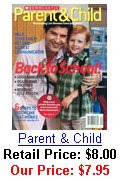 Much of my "Are We Guilty?" posts made oblique references to Jacquelyn Mitchard's WHICH ONES ARE YOURS?, in which she fields a question in such an aggressive way, she admits she categorized, by her interviewer as a "Tiger-Lady-Crabby-Oversensitive-Diva". My question in this essay is, "what's the point of that?" Why be so aggressive, that, even if you are RIGHT, you are still written off?
Much of my "Are We Guilty?" posts made oblique references to Jacquelyn Mitchard's WHICH ONES ARE YOURS?, in which she fields a question in such an aggressive way, she admits she categorized, by her interviewer as a "Tiger-Lady-Crabby-Oversensitive-Diva". My question in this essay is, "what's the point of that?" Why be so aggressive, that, even if you are RIGHT, you are still written off?
Much of my previous discussion came from questioning this stance. Still, the essay is not without it's merits. She does a marvelous job of heading off any attempts by her kids (bio or adopted) of making an issue of adoption during moments of discord. Her DAT (that would be "Dumb Adoption Talk", in the parlance of her kids) eschews the chestnut, "You're not my real mom!" in favor of, "I don't hate you because I'm an adolescent who's trying to adjust to the fact that he was adopted. I hate you personally." While obviously funny, I think it's a good point. How amazing that they've digested the adoption process so thoroughly that they know not to bring it into arguments -- that the bio kids don't use the adopted kids' "primal wound" to do just that. More amazing, is that the adopted kids have the presence of mind not to use their story as a way to inflict damage on their adopted parents. What can be a quick, devastating way to win an argument (or deflect punishment for a curfew violation) can lead to long-term harm in the relationship, a fact sometimes not considered by the adolescent adopted kid.
THE DAY THAT HALLMARK FORGOT by Jesse Green focuses on the intrigue surrounding Mother's Day in a family with two dads. Managing to be both irreverent and touching, it ends on a note that is applicable to all of us: the benefits of being able to "express unconventional truth in conventional terms".
STANDING OUT AND STANDING UP IN THE CROWD by Marcelle Clements is an ode to her unsinkable, adopted son, Luc. Within her celebration, she goes to lengths to refute the psuedo-science of "Adopted Child Syndrome". "...[C]reated by psychologist David Kirschner and first used as a defense in the 1984 trial of an adolescent adoptee accused of setting fire to his home and murdering his parents... the "adopted child syndrome" has been cited as scientific evidence that adopted adolescents are at high risk of becoming liars, thieves and serial killers..." She mentions that this notion has been soundly refuted and that even Kirschner renounced his theory. Still, it seems that in prime-time news magazine shows and other popular "news" media, the "adopted child syndrome" looms large.
DIVORCE, ADOPTION-STYLE by Antionette Martin is a powerful bit of personal testimony -- what happens to children, adopted out to stable, two-parent homes, when those homes lose stability -- and a parent? I can only imagine it would be a life-line for anyone attempting to ensure familial support for adopted children through a stressful divorce. Antionette and her ex, Ted, seem to do as good a job as anybody, in separating without separating from the kids. I hope never to need it!
KEEPING IT ALL IN THE FAMILY by Bob Shacochis tells the rather sad story of an infertile couple on the verge of adopting, when Bob's sister-in-law reveals that she is dying of breast cancer, leaving in her wake a teen daughter and a dysfunctional ex-husband. Bob and his wife, "C", become guardians to the girl, but find her nearly uncontrollable. Her bio-dad creates numerous problems, preventing them from adopting, but also failing in his role as a father. The essay ends with the nature of the relationship unclear -- Bob is both more than and less than an uncle and certainly not a father, although he treasures the one Father's Day card he did receive, as a token of his best attempt at fatherhood. Frankly, this essay did not provide me with much to take away, except, perhaps, that even in the most troubled adoptive parent/adoptee relationship, there is still a memory, a trace of what could have been, to be cherished.
Saturday, April 21, 2007
A Love Like No Other: Variations
Posted by Swerl at 10:20 AM
Labels: A Love Like No Other, adoption, international adoption, Jill Smolowe, Pamela Kruger, transracial adoption
Subscribe to:
Post Comments (Atom)














































1 comments:
I enjoyed this book, also. Of course not all of the stories were about the same scenario my family will be in, but I still found that it got me thinking about situations that could arise, how I would feel, how I would handle them... whatever.
Our little one is only 10 months old, so I am reading as much as I can from others at this point - just to make me think,and help prepare myself for when the difficult stuff comes up.
Post a Comment